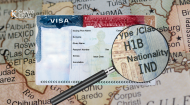In a recent decision by a U.S. immigration court, the future of thousands of Cuban migrants who entered the country and were released with a document known as I-220A has been cast into doubt. This ruling has created uncertainty within the Cuban-American community and raised significant questions about eligibility for permanent residency under the Cuban Adjustment Act. In this blog, we will explore this situation in detail and its potential implications for Cuban migrants.
The I-220A and the Cuban Adjustment Act
The Cuban Adjustment Act of 1966 allows Cuban citizens to apply for permanent residency in the United States after having been in the country for one year and a day. However, the recent ruling by the immigration court questions whether those who entered with an I-220A qualify for this benefit.
The I-220A is a "conditional parole" document that thousands of Cuban migrants received upon crossing the U.S. border. The controversy lies in whether these migrants meet the requirement of having been "inspected and admitted" to the United States, as required by the Cuban Adjustment Act.
According to the court's decision, immigrants who obtained the I-220A "have not been 'inspected, admitted, or paroled,'" which excludes them from being eligible for adjustment of status under this law.
Impact on the Cuban-American Community:
This decision has a significant impact on hundreds of thousands of Cubans who have arrived in the United States in recent years amid a historic exodus from the island. The path to the Cuban Adjustment Act has become narrower in recent years, especially after the "wet foot, dry foot" policy was repealed in 2017, eliminating a preferred route for staying in the country.
Migrants with the I-220A are in an uncertain situation. They can apply for asylum and attempt to demonstrate a case of "credible fear," but this leaves them in a state of pending asylum, renewing their work permits every two years while awaiting an interview date that could be delayed for more than a decade due to the backlog in immigration courts.
Possible Legal Recourse:
Despite this decision, there is the possibility of appealing the ruling. The Department of Homeland Security (DHS) has already appealed the decision of a Florida judge who had deemed it legal for a Cuban migrant with the I-220A to receive permanent residency under the Cuban Adjustment Act.
However, uncertainty persists as the Supreme Court has discretion in accepting or rejecting cases, adding an element of unpredictability to the process.
Call to Action:
Amid this situation, Congresswoman María Elvira Salazar, of Cuban descent, has urged President Joe Biden's administration and DHS Secretary Alejandro Mayorkas to find an immediate solution for the nearly half a million Cubans with the I-220A who are in a legal limbo. The Cuban-American community is looking for answers and a resolution to this confusing situation.
The recent decision by the U.S. immigration court has left thousands of Cuban migrants who entered the country with the I-220A in limbo. As this situation evolves and potentially undergoes appeals, uncertainty lingers within the Cuban-American community. The path to permanent residency under the Cuban Adjustment Act has become more complicated, and a clear approach and solutions are needed to address this issue affecting so many lives seeking a fresh start in the United States.
Please remember that this blog provides general information and should not be considered legal advice. It is always advisable to consult an immigration attorney or the relevant authorities for specific guidance based on your unique circumstances.






